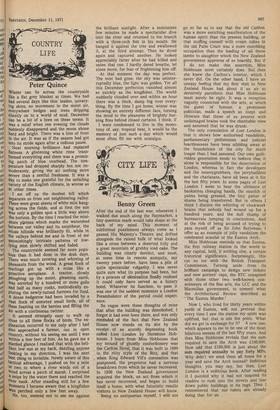Peter Quince
Winter can lie across the countryside like a flat grey blanket at times. We had had several days like this: leaden, unvarying skies, no movement in the moist air, everywhere hedges and trees dripping Silently on to a world of mud. December Can be a bit of a bore on these terms. It Was a relief when one evening the clouds suddenly disappeared and the moon shone hard and bright. There was a bite of frost in the air. It was as if the season had got into its stride again after a tedious pause.
Next morning brilliance had replaced flatness. A glistening white rime transformed everything and there was a promising patch of blue overhead. The temperature had dropped sharply but not imModerately, giving the air nothing more severe than a zestful freshness. It was a day to make one grateful for the unfailing variety of the English climate, in winter as at other times.
I set off up the modest hill which separates us from our neighbouring valley. There were great sheets of white mist hanging across the fields, and at first the sun Was only a golden spot a little way above the horizon. By the time I reached the miniature pLateau which marks the watershed between our valley and its neighbour, the Whole hillside was brilliantly lit, while in the valleys behind me and in front of me astonishingly intricate patterns of lowlying mist slowly shifted and faded. The countryside seemed far more populous than it had done in the drab days. There was much crowing and whirring of Pheasants from the wood. A great flock of starlings got up with a noise like a Primitive aeroplane. A tractor, slowly Ploughing up the moist, gleaming earth, Was escorted by a hundred or more gulls and half as many rooks, methodically exPloring the newly-turned furrows for food. A dense hedgerow had been invaded by a vast flock of assorted small birds, all of them feasting on the berries and filling the air with a continuous twitter.
It seemed strangely easy to walk up Close to all these flocks of birds. The exPlanation occurred to me only after I had also approached a farmer, out in open country, without his seeing me until I was Within a few feet of him. As he gave me a startled glance I realised that with the brilliant low sun at my back, dazzling anyone best in my direction, I was the next °est thing to invisible. Newly aware of this tactical advantage, I pushed on for a mile or two to where a river winds out of a Wood across a patch of marsh. I surprised a. snipe by the water there and reached the river bank. After standing still for a few InoMents I became aware that a kingfisher Was perched only a few feet away. He, too, seemed not to see me against the brilliant sunlight. After a motionless few minutes he made a spectacular dive into the river and returned to his branch with a three-inch fish in his mouth. He banged it against the tree and swallowed it, at the third attempt. Then he dived again and captured another. He looked appreciably fatter after he had killed and eaten that one. I hardly dared breathe, let alone move, for fear of frightening him off.
At that moment the day was perfect. The mist had gone, the sky was uninterruptedly blue, the light was golden. Yet all this December perfection vanished almost as quickly as the kingfisher. The world suddenly clouded over and within an hour there was a thick, damp fog over everything. By the time I got home, winter was showing an entirely different face, turning the mind to the pleasures of brightly burning fires behind closed curtains. I think, if I were condemned to live in the monotony of, say, tropical heat, it would be the memory of just such a day which would most often fill me with nostalgia.










































 Previous page
Previous page